
VOL. II NO. 16 REG NO. L5015 DELHI, THURSDAY DECEMBER 30, 1943.
|
LONDON - Apparently presaging dramatic developments in the European Theater, Gen. Dwight D. Eisenhower was this week relieved of his post as Supreme Commander of the Mediterranean Theater and appointed as "Supreme Allied Commander of the British and U.S. Forces organizing in the United Kingdom for the liberation of Europe."
In addition, Air Chief Marshal Sir Arthur Tedder has been appointed Deputy Commander; Gen. Sir Bernard Law Montgomery of the famous British Eighth Army has been appointed commander of the British group of armies under Eisenhower; Gen. Sir Harold Alexander has been named commander-in-chief of the Allied armies in Italy; Lt. Gen. Harold Spaatz will command all American strategic air forces operating against Germany from all Theaters; and Gen. Sir Henry Maitland Wilson, now Allied Middle East commander, will assume Eisenhower's former post as supreme commander of all three arms, air, land and sea, in the Mediterranean Theater.
SOME SURPRISED
These dramatic changes in the Allied high commands were announced simultaneously in a Christmas Eve broadcast by President Roosevelt and an official announcement from Britain's No. 10, Downing Street. The changes are generally regarded as the first tangible results of the recent Teheran conference between Roosevelt, Winston Churchill and Josef Stalin.
The announcement of Eisenhower's appointment came as a major surprise to many American observers who have persistently predicted that Gen. George C. Marshall, American Chief of Staff, would get the European post with Eisenhower succeeding Marshall in Washington.
MOVE APPROVED
The Army-Navy Journal, however, highly approved Marshall's retention in Washington, on the grounds that he is needed there to advise the President and Congress and to continue to contribute his brilliant organizational abilities to the handling of overall U.S. Army administration.
Indicating the size of the forces now being marshaled for the final blows against Germany, Roosevelt announced that 3,800,000 American troops are now overseas, and that 5,000,000 will be overseas by July 1, although he did not say what percentage of these are or will be massed in the British Isles. Senator Edwin C. Johnson, a member of the Senate Military Affairs Committee, told correspondents, however, that 73 percent of the invasion forces from England would be American.
The line-up of world commands now is: Western European and Pacific fronts - American; Mediterranean and India-Burma - British; European Eastern front - Russian; Chinese land front - Chinese.
A.P.O. Does Yeoman Job With Christmas Mail
Jolly old St. Nick may still be a little late in dropping all of your Christmas packages down the chimney of your C.B.I. basha this Christmas season, but there are two things you shouldn't do about it.
One is: Don't blame the Theater A.P.O. because all of your presents aren't here. The second is: Don't give up hope. A helluva lot of them are right now winging their way toward you.
in fact, the A.P.O. is officially credited with having performed the labors of Hercules in getting as many Christmas packages as it did to C.B.I. recipients in all parts of the Theater. Moreover, considerably more than 90 percent of all packages which had arrived in the Theater prior to Dec. 25 were in the hands of their addressees before Christmas, 1943, became history.
In order to do this, every man in the A.P.O. throughout the Theater worked until all hours of the night between Dec. 19, when the very first consignment of Christmas packages arrived at a West India Port, and Dec. 24, when the last pre-Christmas boatload docked. By 3 p.m. Dec. 24, the last of these packages was on its way from the port.
Not only this, but every available airplane in the Theater was commandeered for the Christmas load. Ordinarily, packages do not move by plane, except to remote outposts. In the emergency,
|
Now for the good news. Altogether, between Dec. 19 and Dec. 24, the A.P.O. moved 4,000 sacks of gifts, totaling 200,000 pounds, to C.B.I.-landers. As the Roundup goes to press, however, 10 times that much, or approximately 2,000,000 pounds of presents, have just arrived in port. These are now beginning to move out to their destinations. So maybe Pfc. Doakes' girl back home didn't forget him, after all. He'll know, very shortly.
Bangkok Struck In Night Attack By EAC Raiders
Bangkok took it again the night of Dec. 23-24 when heavy U.S. bombers of the Eastern Air Command's Strategic Air Force, under Brig. Gen. Howard C. Davidson, plastered the terminus railway station with 25 tons of bombs, while a smaller group of RAF Liberators divided their attention between the yards and the city's arsenal area. Large fires, visible 100 miles away, were burning busily when the raiders turned for home from the fifth raid of the war
|
Two days later, a large formation of American fighter-bombers of the EAC's Tactical Air Force under Air Marshal Sir John Baldwin hit the Anisakan airdrome in Northern Burma in four waves. Three planes were destroyed on the ground and several more damaged; six ack-ack positions were silenced, two buildings were destroyed, and the barracks area strafed.
MEDIUMS AT WORK
The same day two formations of U.S. mediums hit Jap camps at Tadashnga and Yanan, starting numerous fires at both places. The next day, in support of ground troops in the vicinity of Yupbang Ga, fighter-bombers and fighters bombed and strafed enemy concentrations with excellent results.
RAF units of the EAC were active in Southern Burma just before Christmas. On the night of Dec. 21-22 bomber raided riverside installations at Sagaing, and three nights later hit the railway junction at Ywataung.
DIVE BOMBING ATTACK
Meanwhile RAF dive-bombers were maintaining their attacks on the Mayu Peninsula. In Northern Burma, for the three days starting Dec. 22, USAAF fighter-bombers and fighters struck throughout the Hukawng Valley, supporting ground troops and hitting communications and supply lines. The RAF worked out on enemy positions in the Chin Hills and on railway communications at Mandalay.
Two Allied planes did not return from these operations.
SOS OFFICERS WIN LEGION OF MERIT
Maj. John H. Sharpe, QMC, and W/O (junior grade) Richard V. Gaines, CE, both members of the Services of Supply in C.B.I., have been awarded the Legion of Merit for duties performed while with the Army in the Middle East.
Presentation of the ribbons was made my Maj. Gen. William E. Covell, Commanding General of the Services of Supply, in a simple ceremony attended by the principal staff officers of SOS held in front of Covell's office.
14TH A.F. DESTROYS 34 JAP AIRCRAFT
|
BOMBERS HAMMER CANTON TWICE;
CHINESE SUPPORT CONTINUED
14TH AIR FORCE HEADQUARTERS - In three successive days during the past week, 34 Japanese planes were destroyed, 30 probably and 17 damaged by bombers and fighters of the 14th U.S. Air Force, bringing the total since Dec. 12 to 68. Jap-occupied Canton was hit hard twice and Chinese troops in the Tung Ting Lake area were given aerial support. Early in the week, bombers hit Chiengmai in Thailand. In a sweep off the South China Coast, Mitchells sank a 5,600-ton freighter.
Liberators bombed railroad yards in the Thailand raid on Dec. 21. They accurately covered the entire target area and many large fires were observed. On the same day, Mitchells, with fighter escort, attacked Hwajung in the Tung Ting Lake area, starting four large fires. Supporting Chinese troops on the Salween River front, fighters strafed a Japanese landing strip in Northern Burma. Installations were set ablaze.
RAIDERS INTERCEPTED
The next day, 18 Jap bombers with more than 40 Zeros as an escort, paid a return visit to a main 14th Air Force base. Fighters intercepted the enemy, destroying 12 Zeros and five bombers. Fifteen Zeros and three bombers were probably destroyed and 11 Zeros and three bombers were damaged. One 14th Air Force fighter is missing and a fighter and one transport were destroyed on the ground. Only minor damage was done to field installations.
Meanwhile, Mitchells, with fighter escort, attacked Hwajung in the Tung Ting Lake area with excellent results. Many fires and explosions were observed. Jap bombers attempted an attack on an American forward air base. The raiders were intercepted and one enemy twin-engine fighter was shot down. Other Mitchells sank a 5.600-ton enemy freighter on a sea sweep off the South China Coast.
CANTON BOMBED
Liberators, with a fighter escort, dropped 30 tons of bombs on the airdrome at Canton on Dec. 23. Several fires were started, two of which are believed to have been burning aircraft. Returning to their base, the attacking force was intercepted by more than 15 Zeros, six of which were shot down. At the same time, P-38's dive-bombed Huangshanko near Kichun.
The next day, Liberators again attacked an airfield in Canton. Extensive damage was done. In a fight, which lasted nearly 30 minutes, over the target area, 10 Zeros were shot down, 10 more probably and three damaged. One bomber did not return.
ROUNDUP NEW YEAR RESOLUTIONS
READY-MADE FOR G.I.S
 JUST ANOTHER SERVICE
JUST ANOTHER SERVICE
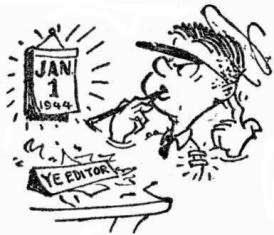
|
This week, the Roundup manfully faces up to a grim task. It is one of the sternest edicts of journalistic tradition that any newspaper which dares call itself a newspaper must come out on or about New Year's Day with a set of New year's resolutions which it recommends to its readers.
Nobody reads them. Nobody pays the slightest attention to them. But Ye Ed and his staff get the gratification of feeling that he and it have done their duty. The next day, then, they can turn with a clean conscience to the uplifting details of the latest Errol Flynn scandal or Tommy Manville divorce suit.
In fact, if you Joes would cooperate, we could turn this into quite a labor-saving device, like a Chinese prayer wheel which sends 10,000 prayers winging aloft for every turn of the wheel. What we mean is, think of the time wasted if every G.I. and officer in C.B.I. takes time off this Saturday to draw up his own resolutions. Probably enough man-hours to build a battleship, if we happened to be in the battleship-building business. Why not get your resolutions ready-made, in this handy, convenient package? The Roundup, as always, is here to serve you.
Here are our recommendations:
(1) Let us firmly resolve to cut down a bit on our consumption of Haig and hag, vintage champagne and fine old wines. It isn't that there's anything wrong, particularly, with these beverages - and a case or two a week is perfectly all right. But, after all, we are supposed to be a democratic nation and so don't want the Nagas or Chinese to get the idea that their fine old bamboo juices and Fighter Brand Whiskeys aren't good enough for us. Friendly gestures like this are always appreciated, particularly from the G.I.'s. So save the champagne swilling for special occasions, such as entertaining the swarms of Hollywood chorus girls now roaming the Theater.
(2) Speaking of chorus girls, let us resolve to cut down on our social life to some extent. It doesn't look too good, during war time, and we must think of the folks back home. They're bearing heavy burdens under rationing of food, clothes and transportation. Some of the 4-F's can't even get zoot suits more than once or twice a year. Think of them, particularly you guys up in the wilds of Ledo, the next time you're caught in a gay, mad whirl of cocktail parties, luncheons, receptions and banquets.
(3) If Gen. George C. Marshall and Secretary of War Henry L. Stimson decide that we can serve our country better at home in some trying desk job in Washington or on special assignment in our own home towns or touring the country with a Hollywood troupe, let us resolve to accept our orders home like soldiers, without argument and without complaint. Your Burma buddies may be a little superior at the thought that you'll miss the exhilaration of the next monsoon season and they won't, but if you're a real soldier, you'll still be able to muster a stiff upper lip and a dry eye as you board the plane or ship back to Shangri La.
(4) Let us resolve to cut down a bit on leaves and furloughs, too, in 1944, again just to show the folks back home that we realize it is our war, too. We know, of course, that the Theater policy is for all officers and enlisted men to take at least two weeks off every month, but let's show that we're willing to do a little more than is asked of us and cut that down to only one. With weekends in Calcutta or Little Washington in between, of course.
(5) And let's resolve, during the coming year, to be a little chummier with the higher-ranking officers of our outfits. After all, they're human, and like to know that their men don't stand in awe of them. A friendly slap on the back instead of a stiff and formal salute, the playful act of pulling the colonel's hat down over his eyes and saying "guess who?" will go a long way toward making his life more interesting over here, and yours, too. This is a particularly good resolution for privates. After all, you can't expect to get stripes unless the boss knows you're around, can you?
Well, there are five dandies, every one a natural, every one easy to keep and every one a solid resolution that will help you go far in the Service.
Incidentally, how far do you want to go? How would 15,000 miles do - just for a starter?
Full Squadron Strikes Key Town of Monywa
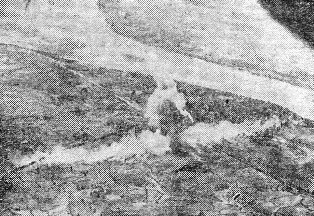 A rising plume of smoke attests to the accuracy of bombs placed upon installations in Monywa after the anniversary
raid on Burma by the Eagle Squadron.
A rising plume of smoke attests to the accuracy of bombs placed upon installations in Monywa after the anniversary
raid on Burma by the Eagle Squadron.
|
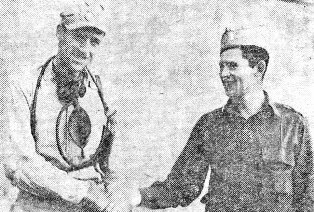 Capt. Ed Weatherly, left, squadron commander, congratulates Lt. T. L. Carey, engineering officer, for putting
every one of the unit's 16 Mitchells into the air for the mission.
Capt. Ed Weatherly, left, squadron commander, congratulates Lt. T. L. Carey, engineering officer, for putting
every one of the unit's 16 Mitchells into the air for the mission.
|
C.B.I. Veterans Pound Targets With Mitchells
EAST INDIA AIR BASE - The Eagle Squadron, commanded by Capt. Ed Weatherly, recently celebrated its first anniversary of B-25 bombing Burma by blasting important installations in the key town of Monywa.
Vital supply lines were demolished and large stores of much-needed gasoline, equipment and materiel blasted into oblivion.
In their initial year of operations over Burma, the veteran medium squadron of the C.B.I. Theater dropped approximately 2,400,000 pounds of destructible in raids which took maximum enemy tolls for a minimum of combat losses.
ALL IN SERVICE
As a "Christmas present" for the anniversary raid on Monywa, Lt. T. L. Carey's engineering crews put the full complement of 16 planes in service to attack the objective, a record unprecedented for the Theater.
In reviewing the year's operations, Weatherly accorded high praise to his combat personnel and, in particular, gave credit to the maintenance men under Carey, who have kept a maximum number of planes in commission to make it possible to "jounce the Jap" all the harder in his Burma hide-outs.
'HAVE WHAT IT TAKES'
"The boys flying our planes have proved they have what it takes," commented Weatherly as he dunked his sharp features into a Yuletide eggnog while relaxing after the anniversary assault. "With the ground crews doing their stuff as they have in the past year, things will be still more uncomfortable next year for the jaundiced jerks of Japan."
Looks as if Tojo's tattered toughies will squirm in Burma in '44.
 OF HORSE AND TONGA
OF HORSE AND TONGA
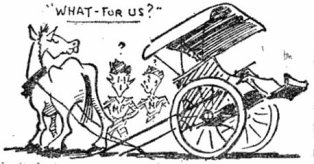
|
The M.P.'s picked up a tonga driver who invited them to go to the out-of-bounds area and meet a white school teacher. When he discovered their identity, he unwound himself from his blanket, which Pfc. Marvin Mitchell was holding, and took off like a startled gazelle.
The surprised Mitchell turned to Sgt. Merle James for instructions. The sergeant, who had been holding the horse, decided to work through channels and reported the matter to Lt. Walter C. Hall, assistant provost marshal for the area.
Hall instructed him to take the horse and tonga to the police station, with the knowledge that U.S. rationing didn't provide for Indian horse vitamins. The police desk sergeant politely took charge of the horse and tonga, issued a receipt and salaamed.
James was a rancher in Wyoming and Mitchell was a cowboy in Texas. However, this was one time when they didn't want a horse.
Japanese Raid On China Base Proves Costly
CHINA - (Special Cable) - Once again, the Japanese Imperial Army Air Force had the living daylight stamped out of it, or more appropriately, shot out of it, when shortly before the hour of high noon on Dec. 22, the enemy directed a formation of approximately 18 bombers and a fighter umbrella of 50 to 60 Zeros into our area of the 14th Air Force.
When the enemy drew near enough to our base to convince us that attack was imminent, our Chinese Blitzer squadron took to the air, led into the scrap by Maj. Edward N. Nollmeyer, fondly called "Big Ed" by members of his outfit. "Big Ed" is the type of fellow the ground crews call an eager beaver, because of his burning desire to fling himself into combat with the enemy.
Flying with the major was an array of topflight pilots. Capts. Earl C. Bishop and Malcomb P. Alfrey, veterans of numerous Nips raids, were there with blood in their eyes. Lts. Duncan, Stiles, Hall, Norberg, Anderson, Machin, Fulford and Frank, men of slightly less experience but with the same spirit and punch, were other pilots out for the kill.
NIP TRICKS FAIL
During the course of the raid and the vicious 150-mile running battle that followed, so many dogfights and maneuvers occurred that it is impossible to enumerate them individually. The Nips used every trick in the books to entice our fighters into various types of death traps, one particular favorite being the fake dogfight which is intended to draw some lone P-40 pilot into their swarm in an attempt to rescue a buddy he thinks is in desperate straits. However, our boys managed to remain just a little smarter than the enemy and continued to hammer the tight bomber
|
For many of the younger pilots it was their first taste of blood - for the oldsters, it was another signal victory which further strengthened their convictions about American flying men and machines.
SCORE LISTED
Individual scores: Maj. Edward M. Nollmeyer - two confirmed Zeros, three probable and two damaged Zeros; Capt. Earl C. Bishop, Jr. - one confirmed bomber and one damaged Zero; Lt. Homer E. Anderson - one confirmed Zero and one damaged Zero; Lt. Alexander R. Duncan - one confirmed Zero and two probable Zeros; Lt. William Fulford - one confirmed Zero, one probable bomber and one damaged bomber; Lt. John M. Machin - one confirmed bomber; Lt. William C. Norberg, Jr. - one confirmed Zero and one damaged bomber; Lt. Walter H. Stiles - one damaged Zero and one damaged bomber; Lt. Jack Frank - one confirmed bomber and one probable bomber.
The box score for all units participating in the attack was 12 fighters confirmed, five probable and 12 damaged; five bombers confirmed, three probable and three damaged.
Our only loss was one fighter plane, the pilot of which is reported safe.
One fighter and one transport were destroyed on the ground and five fighters were damaged.
HELP STORK
ARMY TO RESCUE IN BIRTH
CHINA BASE - Capt. John H. Wax, MC, Chaplain James M. Gilloegly and T/Sgt. Robert Gough had no intention of coming all the way to China to play second fiddle to the stork, but when they arrived at a Chinese village recently to discover a young Chinese woman, alone and unattended, about to give birth to her first-born child, they immediately decided to do something about it.
With Wax officiating with improvised equipment, Father Gilloegly assisting and Gough, a combat photographer, magically producing sheets, charcoal for hot water and even swaddling clothes for the new arrival, the birth went off without incident and a fine, healthy Chinese infant greeted the strange new world with lusty bawls.
The mother, frightened at first by the arrival of three husky foreigners at such a time, managed to make it clear without benefit of English that her heart was full of gratitude for the assistance. Eventually the trio felt even better about their Christmas season Good Samaritan performance when the learned she is the wife of a Chinese guerilla unit officer and has named the little boy after Wax.
PROMISE
SOS COMMANDER GIVES IT
To all members of the SOS, CBI:
On your behalf I have made the following New Year's pledge to the organizations which it is our privilege to serve:
"At the beginning of the year 1944, which promises to become one of the most important in the history of our country, we, the SOS in CBI, hereby resolve to render to your command and the other organizations we serve a service of supply, maintenance and transportation that is comparable to the industrial achievement that has been made by our nation to make such service possible.
"We make no claims to having accomplished perfection during the past year, and do not promise perfection in the year ahead. However, we do solemnly pledge ourselves to strive toward that goal to the maximum of our ability, and as far as it lies within our capabilities, to supply the material means when and where necessary to aid the successful and early accomplishment of your combat missions."
The successful accomplishment of our mission requires the wholehearted co-operation and unstinted energy of each one of us from Private to General, regardless of hours, weather or personal hardship. The fulfillment of this pledge is our best guarantee that the year 1944 will be a happy one for all. > - W. E. R. COVELL, Major General, U.S.A., Commanding
|
JUNGLE TREK TO SAFETY
LIAISON PILOT OF CHINESE ANCESTRY
BRINGS WOUNDED SOLDIER TO ASSAM
ASSAM - Forced down an injured while flying a wounded American-trained Chinese soldier from the Burma combat zone to a hospital in Assam, an American soldier of Chinese ancestry brought his patient to safety after a harrowing trek through the closely-knit jungle.
The pilot is 36-year-old Pvt. Tom Yoke Quon, Chicago, Ill., member of an American liaison squadron which has been flying casualties out of Burma and who for two years was a member of the Chinese Air Force.
On this trip, the engine of Quon's tiny plane failed, but, with desperate skill, he was able to maneuver the aircraft to a crash landing in a small jungle clearing.
Quon took inventory. he had lost four teeth and suffered a fractured finger and a head cut. But the wounded Chinese was only slightly cut on the forehead.
WITHOUT FOOD
Without food other than plants, the pair spent the night in the jungle, where Quon bandaged his own and his companion's cuts and kept the patient warm with his (Quon's) own clothing.
The following day, the pair started out toward India. The wounded Chinese, his left arm in a cast as a result of Jap machine gunfire, alternately walked and was carried by Quon. After more than eight hours hacking their way through the tight jungle, during which Quon used a pistol belt to pull his companion up steep grades, they heard the sound of an engine in the distance and walked towards it.
They finally arrived at a clearing, where they found an American Army Engineer operating machinery pushing the Ledo Road farther into northern Burma. Both men fainted from sheer exhaustion.
JAPS DROWNED FAMILY
Quon enlisted in the Army a day after he learned that his wife and three infant sons were drowned while attempting to escape from Hong Kong in a sampan which was upset by the gunfire of Jap patrol boats. After serving at Jefferson barracks, Mo., and Patterson Field, O., he sailed overseas March 1, 1942. He was only recently transferred from 10th Air Force Headquarters to flying duty with the liaison squadron.
When the Japs over-ran Manchuria, Quon learned to fly at the Alford Flying School at Stinson Field, La grange, Ill., and volunteered for the Chinese Air Force. Holding a second lieutenant's commission, he flew 350 combat hours around China for two years before returning to Chicago, where he operated a catering concern before enlisting in the Air Corps.
30-YEAR-SPAN OF SERVICE
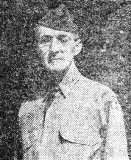
|
CENTRAL INDIA AIR DEPOT - Nearing the 30-year span of a full Army career, tinctured chromatically by service in two wars, M/Sgt. Arthur C. Davis has been appointed warrant officer (junior grade) in the China-Burma-India ASC.
At his air base here, his appointment was accorded more than the casual attention that war-busy troops have a habit of giving. The staff of supply officers, with Col. Isaac C. Siemens, CO, gathered in the mess hall with the enlisted men to pay "Dave" tribute.
It's going on 29 years now since he first donned khaki for Uncle Same in 1914, beginning as a wagoneer (remember those days?) with the U.S. Cavalry. He spent three years in the Philippines and returned home just as the dark clouds of the first World War broke. He spent 16 months in France with the Cavalry, returned home and joined the Motor Transport Corps as a first sergeant. In 1925, he transferred to the Coast Artillery Corps and three years later found him serving with the Medical Department. Finally, he switched to the Air Corps in 1931 and took a reduction in grade to private, first class, to obtain the transfer. He's been with the Air Corps ever since and, while he's entitled to retire after 30 years, he's determined to "stick it out 'til it's over, over here."
He came to the CBI Theater with the first group of Air Corps pioneers.

'Nicest Brawl' At Port Base Peps G.I.'s
By Sgt. EDDIE PHILLIPS
WEST INDIA PORT - On a recent Friday night, war-weary sad sacks of the Blank Air Base squadron at this West India seaport put on the new shoes they had just purchased at the PX and proceeded to break them in at what we have good reason to believe was just about the nicest brawl that has been staged in these parts since Bernarr McFadden was a 97-pound weakling.
The name of the shindig was "The Military Promenade," vulgarly called a "G.I. Prom." And the bulk of the cabbage used to finance this big event came, strangely enough, from that phantom, ephemeral source commonly known and referred to as "The Squadron Fund."
As most G.I.'s know, a squadron fund usually is that thing to which you contribute (like a blood bank) that is ultimately used to purchase a 36-tube radio for the permanent party at the last base to which you were attached before you got shipped overseas. Well, as some sucker said, "He who hesitates is lost," so we didn't hesitate. Instead, we pooled our waning energies (propaganda) into organizing one gigantic swing blitz and set out to discover if that other old sage was right who once remarked, "A fool and his money are some party." He was right, incidentally.
WIMMIN, YOU SAY?
Wimmin, did you say? We had more wimmin at our dance than attended Rudolph Valentino's funeral (Assam papers please do NOT copy.) Dignitaries included Brig. Gen. Haddon and our new base commander, Col. McPike. Neither of these is an ardent jitterbug, so they watched festivities, just out of range of flying hoofs. Super deluxe chow was served buffet style by a famous local hash-walla under the exacting eye of S/Sgt. Freddie Baumgartner, and music was furnished by our very own Swing patrol, a G.I. aggregation composed almost entirely of musicians. Their jive is a solid as the bleeps of Rosie the Riveter.
Our toupees are off, too, to our C.O. Capt. (He Dood It) Joe Cartledge, and to Sgt. Lewis A. Wolfe, who made most of the arrangements. And to Sgts. John Morissette and Joel Davenport and our brave and fearless bartenders, Pvts. Howard Melady and Bill Ziegler. Oddities in the news: Cpl. A. Baker volunteered for C.Q. that night.
NOBLE GUINEA PIGS
At this time we want to thank all those noble guinea pigs who so graciously volunteered to taste each cocktail as it was mixed. The names of those who took part in this noble experiment will not be disclosed until their next of kin have been notified. Seriously, some of the boys had so much cr me de menthe in their blood that they still looked somewhat green around the gills the following morning.
The important thing, however, is that everybody had a good time and nobody got hurt. As one G.I. expressed it, very succinctly, "It was a right nice party. I didn't hit nobody and nobody hit me."
ASC VETERAN LEAVES C.B.I.
ASC BASE IN INDIA - Maj. Joe A. McKeown, homeward-bound after 21 months in the C.B.I. Theater, has left behind him a trail of accomplishment and flying service since arriving in May, 1942, wearing a shave-tail's gold bars and faced with the task of setting up operations against the Japs.
McKeown was a captain for the Northwest Air Lines for five years and, with this experience as a background, set up the ASC test flight procedure upon which the success of air missions substantially rests. He chalked up the first instrument let-down procedure by which aircraft come in during bad weather by using radio stations instead of the established beam, and trained a corps of outstanding test pilots.
Slight Delay FOR FOOTLOCKER
CHINA - In June, 1942, Pvt. R. P. Holding arrived from India, leaving a footlocker full of clothing behind him.
Eighteen months and five promotions later, T/Sgt. Holding and his footlocker were reunited when the locker was delivered to him at the alert shack of the "Sky Dragons," medium bombardment squadron of the 14th AAF in China.
Said Holding, "I was beginning to wonder about it."
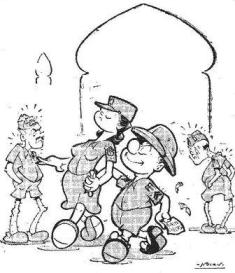
|
C.B.I.'S WACS MAY CAVORT ONLY WITH G.I.'S
Oh happy day.
The millennium for the down-trodden EM, the Roundup is privileged to announce, has arrived, at long last.
The responsible party is Albert C. Wedemeyer, who not only wears an air of quiet dignity but also the two authoritative stars of a major general upon his shoulders as Deputy Chief of Staff of the Southeast Asia Command.
This fearless champion of the rights of genus enlisted manus gave them a Christmas present and, at the same time, wearers of brass a sharp warning in the announcement that the beautiful bevy of WACs soon to arrive in CBI-land will spend their off-duty hours in the pleasant, convivial companionship of privates, corporals and sergeants, only.
Unless officers wish to risk the heavy hand of an obdurate MP upon their sensitive shoulders, they are advised, "Brothers, hands off."
Specifically, the order reads:
"No officer of the WAC will fraternize or have social appointments with enlisted members of the Allied Forces.
No enlisted member of the WAC will fraternize or have social appointments with commissioned officers of the Allied Forces.
|
"Obviously, exception of the above will be made when family relationships or similar circumstances are involved. Requests for such exception will be submitted in writing to the CO, WAC detachment, SEAC."
It is evident that the good and wise general is cognizant of the fact that an enlisted man's chances in competition with an officer are comparable to a hobo's prospects of crashing the Stork Club. What is a poor gal to do when a pair of eagles (or even shiny looey's bars) bedazzle her eyes? She might not be able to see a pair of stripes, even if constructed of neon. Additionally, Mr. Average G.I. is also in the lower income bracket, and a lurching tonga ride behind an emaciated dobbin must suffice, instead of a smooth turn in a taxi.
The comeback offered by several officers that "there ain't no such rule in the books" falls on ears as deaf as those on a brass statue. Some customs in the service are stronger than written law, and one of these is a taboo on fraternization between officers and EM. The WAC is now an integral part of the Army, solemnized by act of Congress.
Enlisted men's noses shouldn't bleed too profusely for the brass, however, for it must be pointed out that they have the corner on most of the available CBI femininity in the Theater in the persons of the starched angels in white of the Army Nurse Corps. The Red Cross gals, of course, are considered fair game for all personnel, but there, again, the brass with their crores of rupees and sleek taxis have the edge.
The C.B.I. Roundup is a weekly newspaper published by and for the men of the United States Army Forces in China, Burma, and India, from news and pictures supplied by staff members, soldier correspondents, the United Press, and the Army News Service. The Roundup is published Friday of each week and is printed by The Statesman in New Delhi, India. Editorial matter should be sent directly to Lt. Floyd Walter, Rear Echelon Hq., U.S.A.F., C.B.I., New Delhi, and should arrive not later than Monday in order to make that week's issue. Pictures must arrive by Sunday and must be negatives or enlargements. Stories should contain full name and organization of sender.

DECEMBER 30, 1943
Original issue of C.B.I. Roundup shared by Ruth Canney, widow of CBI veteran John Canney.
Copyright © 2007 Carl Warren Weidenburner
CAPTAIN'S DREAM GIRL
TOP OF PAGE PRINT THIS PAGE ABOUT THIS PAGE SEND COMMENTS
PREVIOUS ISSUE CLOSE THIS WINDOW NEXT ISSUE
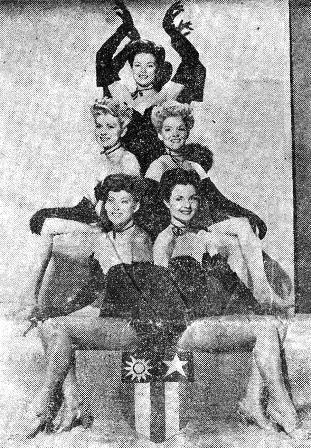 One way for the Roundup to start the New year off in proper fashion is to introduce not one, but five
lovelies for its page one cheese-cake. They're Goldwyn girls, and Sam proves he is still astute at picking
'em.
One way for the Roundup to start the New year off in proper fashion is to introduce not one, but five
lovelies for its page one cheese-cake. They're Goldwyn girls, and Sam proves he is still astute at picking
'em.
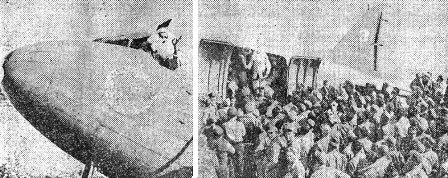 When a plane swooped down upon a forward base runway of the 14th Air Force in China, who stepped out of it but
a modern Santa Claus who needed no reindeer, bringing Christmas gifts from Shangri La. "Santa" - Lt. James E. McNeil
- was greeted by Col. David L. (Tex) Hill, former AVG ace, now commanding officer of a fighter group.
When a plane swooped down upon a forward base runway of the 14th Air Force in China, who stepped out of it but
a modern Santa Claus who needed no reindeer, bringing Christmas gifts from Shangri La. "Santa" - Lt. James E. McNeil
- was greeted by Col. David L. (Tex) Hill, former AVG ace, now commanding officer of a fighter group.
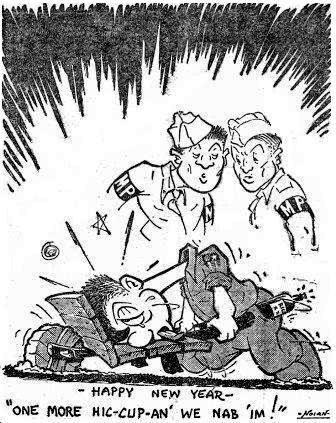
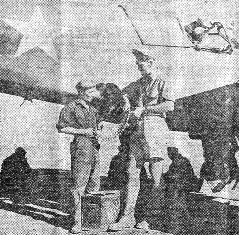 The Chinese-American Air Force Training Command "somewhere in India" has reunited a former
armorer of the AVG and a Chinese armorer who lost track of one another during the chaotic withdrawal of Allied forces
from Burma. The American is S/Sgt. Moose Ruman, who stretches into the ozone 6 feet and 5 inches, and the Chinese is
Leon, who could bite him in the kneecap without stooping.
The Chinese-American Air Force Training Command "somewhere in India" has reunited a former
armorer of the AVG and a Chinese armorer who lost track of one another during the chaotic withdrawal of Allied forces
from Burma. The American is S/Sgt. Moose Ruman, who stretches into the ozone 6 feet and 5 inches, and the Chinese is
Leon, who could bite him in the kneecap without stooping.
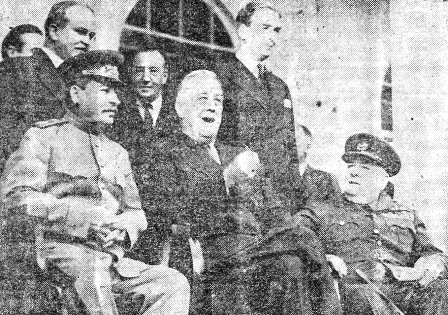 There's hardly any need to introduce the actors in this drama: Marshal Stalin, President Roosevelt and Prime
Minister Churchill. The decisions they reached at their historic three-day conference at Teheran will have
a far-reaching effect in the mounting offensive against the enemy. Behind Stalin is Russian Foreign Minister
Viacheslay Molotov and between Roosevelt and Churchill is Anthony Eden.
There's hardly any need to introduce the actors in this drama: Marshal Stalin, President Roosevelt and Prime
Minister Churchill. The decisions they reached at their historic three-day conference at Teheran will have
a far-reaching effect in the mounting offensive against the enemy. Behind Stalin is Russian Foreign Minister
Viacheslay Molotov and between Roosevelt and Churchill is Anthony Eden.
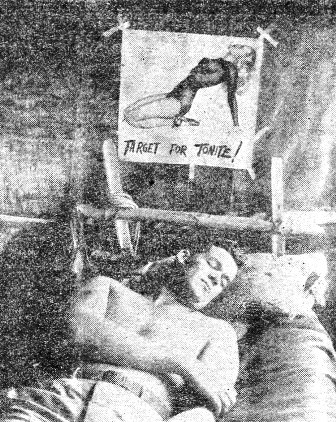 "Well, I can dream, can't I?" seems to be Capt. R. N. Skipper's reaction, between flight missions in the
Southwest Pacific. His B-24 outfit's raids encompass a distance of 3,000 miles and thus it is allowed only
four or five raids a month.
"Well, I can dream, can't I?" seems to be Capt. R. N. Skipper's reaction, between flight missions in the
Southwest Pacific. His B-24 outfit's raids encompass a distance of 3,000 miles and thus it is allowed only
four or five raids a month.